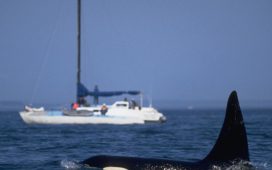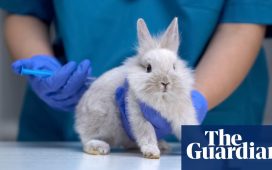The world has the opportunity in the next 10 years to restore our oceans to health after decades of steep decline – but to achieve that, people must wake up to the problem, join in efforts to protect marine areas and stop eating tuna, according to the oceanographer and deep sea explorer Sylvia Earle.
“We are at the most exciting time maybe ever to be a human, because we’re armed with knowledge,” said Earle, also known as the Queen of the Deep and “her Deepness”. Earle has also set numerous records for deep sea diving, and was the first woman to serve as chief scientist of the US National Oceanic and Atmospheric Administration.
“We can see what we could not see when I was a child. And the children of today are being given a super-dose of that knowledge – that you can see Earth from space, and they know that there are creatures in the ocean.”
With that unprecedented level of knowledge came responsibility, she said – the oceans were in the poorest health since humans started exploiting them, denuded of fish, filled with plastic debris, tainted with chemical pollution and acidified by the carbon dioxide still being poured into the air.
“That’s where we’re at. That’s the next 10 years, with this new awareness of the trouble we have created for ourselves, and 2020 [and the Covid-19 pandemic] should have been the big wake-up call. We humans, we have to listen to the laws of nature and face up to the reality that we’re causing our own misery,” she said.

That will involve changes to our rampant overconsumption and waste, to encourage people to value the natural world rather than treat it as a commodity. “For the most part, what we take from the high seas is a luxury, it’s not a need. It’s not food security, if’s food choice. Who in the world really needs to eat tuna?” she asked. “This is a luxury choice, new for most people on the planet since towards the end of the 20th century, when marketing created this appetite for tuna that didn’t exist early in the 20th century. People got along perfectly well and ate well without eating tuna.”
Earle praised efforts to get governments to commit to protecting at least 30% of the world’s oceans by 2030, a target to which scores of countries have now signed up. She called for countries to go further and call for a halt to industrial fishing, which she said was destroying fish populations around the world.
“I think the biggest problem is the legal endorsement of industrial scale fishing,” she said. “Why is industrial fishing profitable? Well, actually it isn’t, if you put all the costs on the balance sheet – the subsidies that enable these big ships to travel thousands of miles, to distant places to capture animals that have a zero accounting base until they’re taken, until they’re killed. Swimming in the ocean we don’t account for them as anything of value.”
She added: “You cannot justify fishing on the high seas on an economic basis, because these are subsidised fleets from a handful of nations that are disproportionately taking from the global commons, that every person on the planet has vested interest in.
“We really have to scale up [ocean conservation efforts] in a way that will magnify globally in the next 10 years. It’s the last best chance we will ever have to go from planetary decline to really levelling off and recovering from a history of our species that is based on taking from nature.”
Earle said: “We are seeing a diminished planet – I’m a witness in my lifetime – but it’s not too late, armed with knowledge, to reverse the decline. The next 10 years will be a critically important decade.
“We just have to pull up our socks, look around and say: OK, how much do we really need and how much of it is a choice? How can we have a really prosperous world, living within the natural systems that make our existence possible?” she said.

Born in 1935 in the eastern US, Earle studied in Florida, California, and at Harvard University before pioneering deep sea research submarines in the 1980s. Time Magazine named her its first Hero for the Planet in 1998, and this year she featured in the film Seaspiracy. She is president of Mission Blue, a foundation for ocean conservation.
The Covid-19 pandemic had opened people’s eyes to the wonders of the natural world, she said. She added that people were beginning to realise the fragility of the planet, amid a global crisis in biodiversity on land and at sea, and could act now before it was too late.
“The most important thing we take from nature is our existence. We have a planet that functions in our favour – the air we breathe, the water that magically falls out of the sky. A temperature regime that is habitable for us, not too hot, not too cold overall. Humans have prospered over the last 10,000 years.”
Earle said international meetings this year on biodiversity, the oceans and the climate could make 2021 a “critically important year”. The G7 group of wealthy nations – the UK, the US, Canada, Japan, Germany, France, Italy, plus the EU – are meeting in Cornwall this weekend, where oceans will be on the agenda.
Working on a new National Geographic television series about activists and people working to improve the seas called Perpetual Planet: Heroes of the Oceans, she said she felt uplifted and hopeful about what could be achieved.
“I am really inspired and energised, and I just can’t wait to get out there and do what I was doing before 2020, and will be doing again as time goes on, to be a part of this great era of exploration, empowering the kids, spreading the word and being a part of this shift from decline to recovery to prosperity. It’s within our grasp. We can do this – in fact, we must do this,” she said. “Dinosaurs didn’t have a choice, but we do.”













